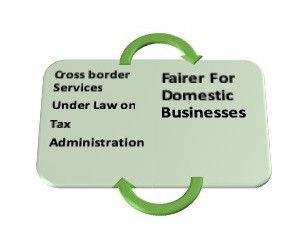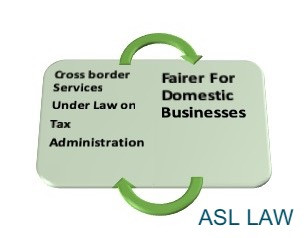After 10 years of implementation of Law on Tax Administration has achieved many positive results. However, in addition to the achieved results, there are still difficulties and challenges in tax administration activities, including tax management for businesses providing cross-border services on Internet (Published on Vietnam law Magazine).
On November 29, 2006, the National Assembly for the first time enacted the law on Tax Administration, creating an important legal basis for the management of taxes and other revenues of the state budget. The amended and supplemented law in 2012, after more than 10 years of implementation has achieved positive results, ensuring strict management of revenue sources; enhancing awareness of the people and businesses towards fulfilling tax obligations to the state budget (State Budget).
Boom of e-commerce platform
It can be said that Vietnam is enjoying advantages of telecommunications and information technology when it has built a qualified network of information technology infrastructure and services. High-quality telecommunications services cover the entire territory of the country.
As a result, over the past five years Vietnam has recorded an explosion of e-commerce including both domestic and cross-border e-commerce. This is a completely new way of buying and selling goods and providing services, changing almost all conceptions about buying and selling goods and providing traditional services when users in Vietnam can buy real estate, any goods, and use any service provided by any organization or individual anywhere in the world.
The names of e-commerce giants in the world such as Amazon, Alibaba, Ebay or digital content service providers such as Netflix and Spotify are no longer strange to Vietnamese people.
However, the change that brings users convenience creates challenges and pressures for regulatory agencies, especially tax authorities in collecting taxes for enterprises providing cross-border services. These enterprises have revenue from Vietnam but do not have to pay or pay any tax to the Vietnamese state agencies. This is obviously not fair for businesses operating, doing business in the territory of Vietnam.
Current situation of tax collection for businesses providing cross-border services.
Currently, the legal document which is being applied to implement tax management for foreign organizations and individuals doing business in Vietnam or having income in Vietnam is Circular 103/2014 / TT-BTC. However, this Circular applies only to foreign individuals and organizations that have permanent establishments in Vietnam or although do not have permanent establishments in Vietnam but generate income based on contracts, co-operation with individuals and organizations in Vietnam.
For cases where foreign organizations and individuals do not have a permanent establishment in Vietnam and earn income directly from Vietnamese users without going through any partners in Vietnam, there is currently no legal basis and mechanism for tax administration for these subjects.

Recently, several Vietnamese authorities have spoken out about this situation. In addition to other specialized management activities, the issue of tax payment of a number of cross-border service providers is also raised for analysis and evaluation. Many people said that Netflix, Iflix, Amazon, Facebook did not perform the responsibility of declaring, paying taxes, causing inequality with Vietnamese businesses, they were not even subject to management, no censorship of content potential risks for state management.
Significant content about tax administration for cross-border service providers.
In order to resolve this situation, on June 13, 2019, the National Assembly of Vietnam passed Law No. 38/2019 / QH14 on tax administration to replace the existing legal documents. This new law has two major provisions as a legal basis for tax administration for cross-border service providers as follows:
-
Obligation to declare and pay taxes in Vietnam:
Accordingly, for e-commerce business activities, digital-based business and other services performed by suppliers in foreign countries without permanent establishments in Vietnam, the overseas suppliers have direct obligations or authorization to make tax registration, tax declaration and payment in Vietnam according to the Finance Minister’s regulations.
-
Obligations of commercial banks:
Deducting and paying in lieu of payable tax obligations according to the tax law of organizations and individuals in foreign countries conducting e-commerce business activities generating income from Vietnam.
Thus, in addition to the obligation to register, declare and pay taxes of organizations and individuals providing cross-border services, the Law on Tax Administration also stipulates additional obligations of commercial banks in deduct and pay in lieu of the tax liabilities of these subjects. To provide more detailed guidance on the obligations of commercial banks, the draft decree guiding the implementation of the Law on Tax Administration requires banks to deduct, pay on behalf of tax obligations to overseas suppliers. According to the tax law on each product or service that buyers in Vietnam must pay to foreign suppliers based on each transaction that buyers in Vietnam pay to suppliers in foreign businesses related to e-commerce and digital-based business activities under the guidance of the Ministry of Finance. Although it is still a draft, it can be considered as a guideline for commercial banks in preparing technical and human resources and conditions to implement this regulation when it is officially issued.
Under the new regulations, cross-border service providers are responsible for tax registration, tax declaration and payment directly or authorized to perform in Vietnam according to the regulations of the Minister of Finance. Although specific provisions are still awaiting guidance in the bylaws promulgated by the Ministry of Finance, it can be clearly seen from the time the Tax Administration Law 2019 comes into effect (July 01, 2019), Vietnam’s competent state agencies have sufficient legal basis to implement management and enforcement measures for this group of taxpayers in case they do not comply with the regulations on registration, declaration and payment of taxes. This will create a fairer competition for domestic businesses.
This article is exclusive for Vietnam Law Magazine by Lawyer Pham Duy Khuong, Managing Director of ASL LAW
—-Other News—-
– E-Commerce Platform – Road To Success In Vietnam And Cross-Border Trading
– More legal responsibilities required with establishing budding startups across Vietnam
– Draft Vietnam Investment Law: Revising key laws to lead Vietnam into the new era
– E-Commerce Platform – Road To Success In Vietnam And Cross-Border Trading
– Vivid M&A picture ahead due to legal fine-tuning

 Tiếng Việt
Tiếng Việt 中文 (中国)
中文 (中国) 日本語
日本語

